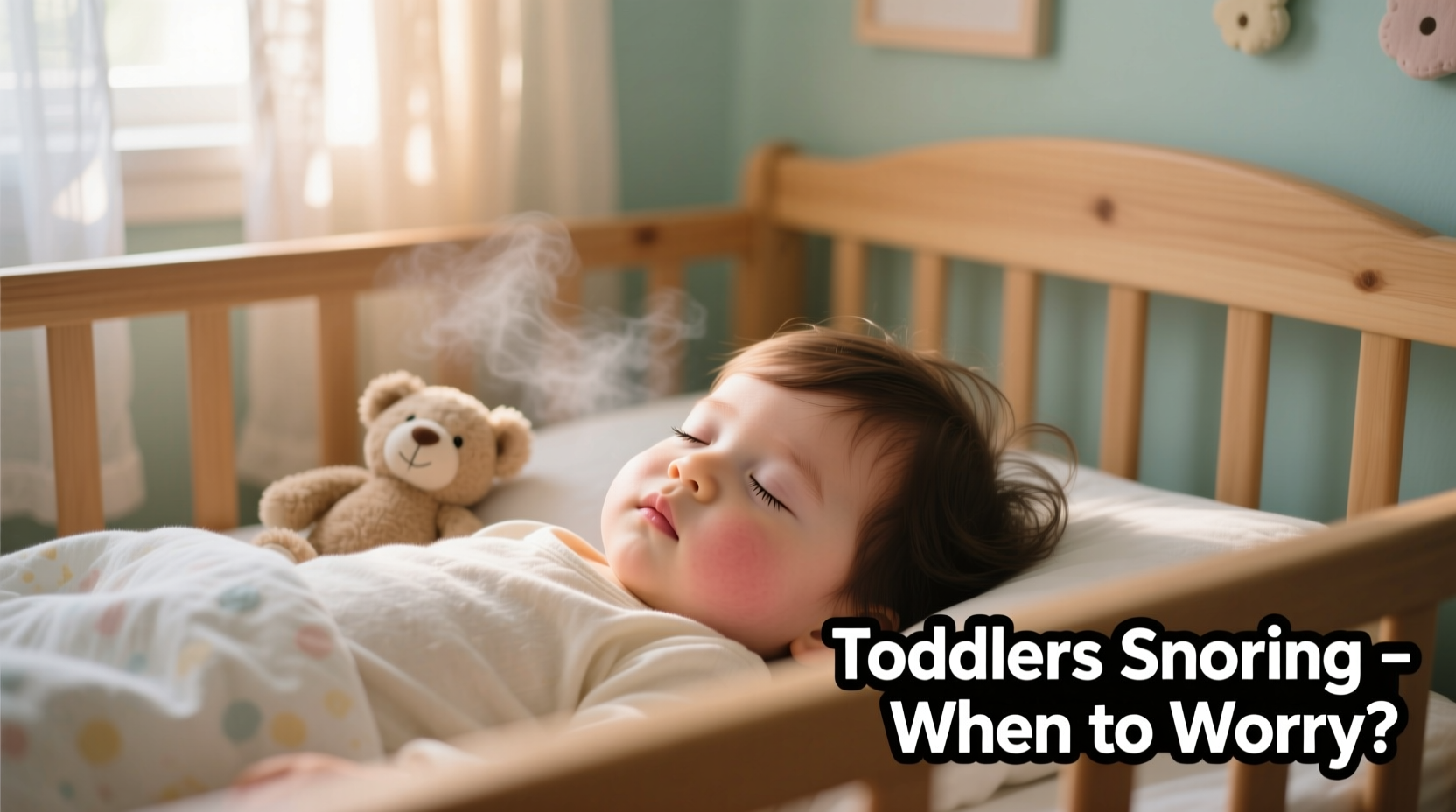Snoring in toddlers is more common than many parents realize, but when it starts suddenly and wasn’t present before, it can be alarming. While occasional snoring may be harmless—especially during a cold—persistent or loud snoring could signal an underlying issue that needs attention. Understanding the causes, recognizing red flags, and knowing when to consult a pediatrician are essential steps in ensuring your toddler’s sleep quality and overall health.
Common Causes of Sudden Snoring in Toddlers

Sudden snoring often stems from temporary conditions, but some triggers require closer monitoring. The most frequent causes include:
- Upper respiratory infections: Colds, sinus infections, or allergies can cause nasal congestion, leading to narrowed airways and snoring.
- Enlarged adenoids or tonsils: These lymphatic tissues can swell due to repeated infections, obstructing airflow during sleep.
- Allergies or environmental irritants: Dust mites, pet dander, or mold in the bedroom can inflame nasal passages.
- Change in sleeping position: Toddlers who transition to new beds or pillows might sleep in positions that restrict breathing.
- Obesity or weight gain: Excess tissue around the neck can narrow the airway, increasing snoring risk—even in young children.
While most cases resolve on their own, especially if linked to a short-term illness, persistent snoring beyond two weeks warrants evaluation.
When to Worry: Red Flags That Require Medical Attention
Not all snoring is dangerous, but certain symptoms suggest a more serious condition such as obstructive sleep apnea (OSA). This disorder involves repeated pauses in breathing during sleep and can affect a toddler’s growth, behavior, and cognitive development if left untreated.
“Persistent snoring in toddlers, especially with gasping or choking, should never be ignored. It may indicate disrupted oxygen flow during critical brain development stages.” — Dr. Lena Peterson, Pediatric Sleep Specialist
Seek prompt medical advice if your child exhibits any of the following:
- Loud, chronic snoring occurring more than three nights per week
- Pauses in breathing during sleep lasting several seconds
- Gasping, choking, or snorting sounds while asleep
- Restless sleep, frequent awakenings, or night sweats
- Sleeping with the mouth wide open or neck extended
- Daytime symptoms like excessive fatigue, irritability, or difficulty concentrating
- Behavioral issues such as hyperactivity or poor attention span
- Frequent bedwetting despite being potty-trained
If multiple red flags are present, schedule an appointment with your pediatrician or a pediatric ENT (ear, nose, and throat specialist).
Step-by-Step Guide: What to Do When Your Toddler Starts Snoring Suddenly
Follow this practical timeline to assess and respond appropriately:
- Monitor for 5–7 days: Track frequency, volume, and associated symptoms. Note whether snoring occurs only during illness or persists afterward.
- Improve sleep environment: Remove allergens, use a humidifier, ensure proper ventilation, and avoid scented sprays or air fresheners.
- Adjust sleeping position: Encourage side-sleeping if safe and comfortable. Avoid soft bedding or stuffed animals near the face.
- Evaluate diet and weight: Discuss nutrition with your pediatrician if weight gain has been rapid.
- Consult your pediatrician: If snoring continues beyond two weeks or worsens, request a full evaluation.
- Consider a sleep study: For suspected OSA, a polysomnogram (overnight sleep test) may be recommended to measure breathing patterns and oxygen levels.
- Discuss treatment options: Depending on diagnosis, treatments may include allergy management, medications, or surgical removal of enlarged tonsils/adenoids.
Do’s and Don’ts: Managing Toddler Snoring at Home
| Do’s | Don’ts |
|---|---|
| Use a cool-mist humidifier in dry climates | Give over-the-counter decongestants without doctor approval |
| Clean bedding weekly in hot water to reduce dust mites | Allow pets in the toddler’s bedroom |
| Elevate the head of the crib mattress slightly using books under the legs | Place pillows or thick blankets in the crib (choking hazard) |
| Keep nasal passages clear with saline drops and a bulb syringe | Ignore snoring combined with daytime behavioral changes |
| Track symptoms in a sleep journal | Delay seeing a specialist if breathing interruptions occur |
Real Example: A Parent’s Experience with Toddler Sleep Apnea
Sarah, a mother of a 28-month-old boy, noticed her son began snoring loudly after recovering from a severe cold. At first, she assumed it was residual congestion. But after three weeks, the snoring continued every night, accompanied by restless tossing, sweating, and morning crankiness. He also started having temper tantrums during the day and struggled to focus during playgroup.
Concerned, Sarah recorded a video of his sleep and showed it to her pediatrician. The doctor referred them to a pediatric ENT, who diagnosed enlarged adenoids causing obstructive sleep apnea. After a minor outpatient surgery to remove the adenoids, the snoring stopped completely within a week. Within days, Sarah noticed dramatic improvements in her son’s mood, energy, and attention span.
This case highlights how timely intervention can transform both sleep quality and daily functioning in young children.
FAQ: Common Questions About Toddler Snoring
Is it normal for toddlers to snore occasionally?
Yes, occasional snoring during or just after a cold is common and usually resolves once congestion clears. However, regular or loud snoring should not be dismissed as normal.
Can allergies cause snoring in toddlers?
Absolutely. Allergic rhinitis leads to swollen nasal tissues and increased mucus production, narrowing airways and contributing to snoring. Identifying and managing allergens can significantly improve breathing at night.
What age is most common for sleep apnea in toddlers?
Sleep apnea peaks between ages 2 and 6, coinciding with the natural enlargement of tonsils and adenoids. Early detection is key to preventing developmental delays.
Conclusion: Prioritize Healthy Sleep for Long-Term Well-Being
Sudden snoring in a toddler isn’t always a crisis, but it shouldn’t be ignored either. Breathing disruptions during sleep can impact physical growth, emotional regulation, and cognitive performance. By staying observant, improving sleep hygiene, and seeking expert guidance when needed, parents can protect their child’s long-term health.









 浙公网安备
33010002000092号
浙公网安备
33010002000092号 浙B2-20120091-4
浙B2-20120091-4
Comments
No comments yet. Why don't you start the discussion?